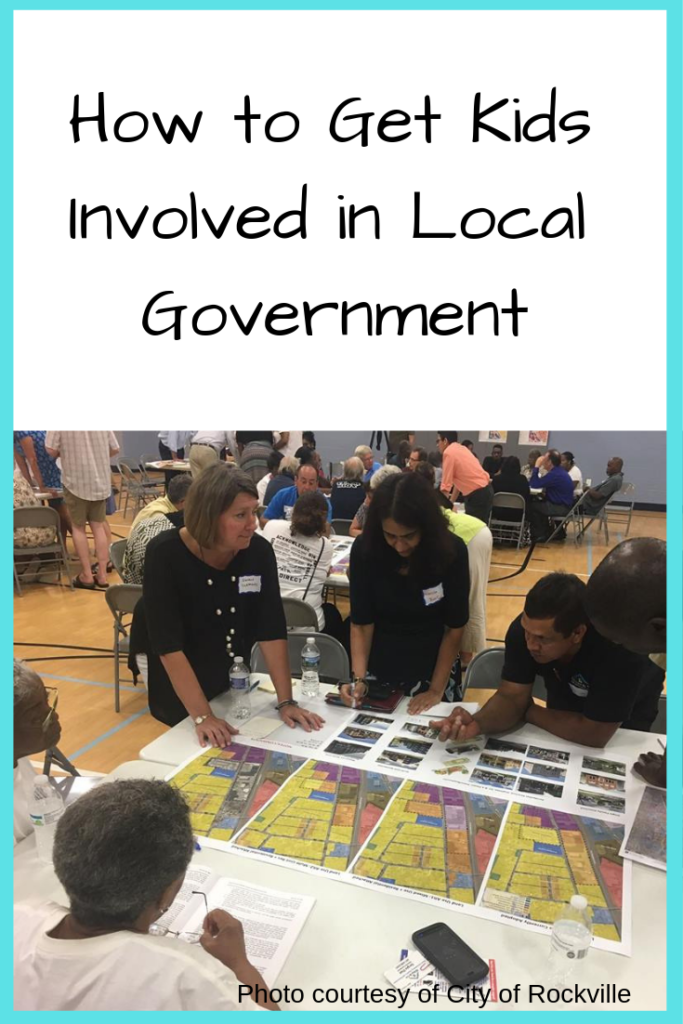
“I’m not going to be here for dinner tomorrow,” I told my kids. “I’m going to tell the people in charge of the city that I support our neighbors from other countries.” I was going to speak at our city council meeting about a proposed Sanctuary Cities policy. They nodded, then went back to eating dinner. While their interest in local government is pretty low at two and five years old, I hope that I can help get them more involved as they get older.
That’s because local government at the heart of a lot of policies that underlie unjust systems. It’s also a place you can see personal impact. While calling your Congressperson or national representative is important, you can rarely see the same level of individual response and even change that you can on the local level. From climate change to racist policing, getting involved in local government is one of the biggest ways you can teach kids to make a difference.
Here are some ways you can get your kids involved:
Point out or engage with local elected officials in public events
Every year, our town has a massive Memorial Day parade, with a zillion community groups participating. Taking their place at the beginning of the line, our city council members ride along in old-fashioned cars. As we see them go by, I point out who they are and why they’re in the parade to my kids. Often, government can feel very far away, full of people you’ll never meet. Helping our kids know that our neighbors make policy makes it more accessible.
Research your city or county’s policy or status on an issue
Pick an issue that your family is passionate about – school funding, water quality, almost anything! – and look into the city or county’s record on it. Many cities have their records publicly available on their website. If they don’t, your local librarian can often help you find them. (Knowing how to access public records is generally part of the job.) Looking up this information also teaches your kid research skills – bonus!
Envision your ideal neighborhood or city
Often, thinking about what you would like things to be like can be empowering. Brainstorm with your kid what your ideal city would look like – how it would be set up, how you would get from place to place, what kind of stores there would be, what kind of events or community activities would exist. Think about how that ideal reflects your own values and assumptions, both good and flawed. What stands in the way of the city being like this? What actions could you take to change it?
Write a letter to your city / county council
If you’ve found an issue you care about and it’s something the city or county council can do something about, write them an email! Local government officials are way more likely to read your messages and actually listen than national leaders who get thousands of messages a day. They may not have ever recognized the problem or seen how they can help. Bringing it to their attention can make a difference.
Attend or even speak at a city/county council meeting
Just watching a city council meeting – who speaks, what gets discussed, what’s seen as important – can provide a lot of insight. In many places, you don’t even have to go in person. Our city council streams its meetings on the local TV channel and online. If you really want to go beyond writing a letter, you or your kid can actually speak at a city council meeting. Our council has hearings regularly on policy issues, where individuals can comment for three minutes or less. They also have “open forum” at most meetings where citizens can sign up to comment on a topic the city isn’t actively considering at the moment. It’s incredibly good practice and experience for public speaking.
Go to a neighborhood meeting
Another way to find out what’s going on is to go to a neighborhood meeting. Most neighborhoods or HOAs have meetings where they discuss the issues facing the neighborhood, from pedestrian safety to what color someone can paint their shutters. Admittedly, they can be terribly dull, but they’re worth attending once. It’s also useful to see how racism and classism can arise in veiled (and sometimes not-so-veiled) references in these meetings. It’s probably the best to attend one with a specific issue you have in mind that you’d like to discuss.
Check out Mayor for a Day programs and internships
Some states and cities have “Mayor for a Day” programs, where students can write an essay about policies they would change. The winner then gets to shadow the mayor for the day. For older kids, internships may be an option. Most of the time, government internships are only available to students who can live in a major city like Washington DC. But I interned with my very suburban town’s environmental specialist in high school and had a great experience. They were way more flexible in terms of schedule than a big city government would be. They even paid me!
Has your family ever gotten involved or engaged in local government?
For more on where making a difference and parenting meet, follow We’ll Eat You Up, We Love You So by Shannon Brescher Shea.
Pingback: Practicing Democracy with Our Kids - Family Leadership Center
Pingback: Wrestling with and Moving Through Climate Grief - We'll Eat You Up - We Love You So